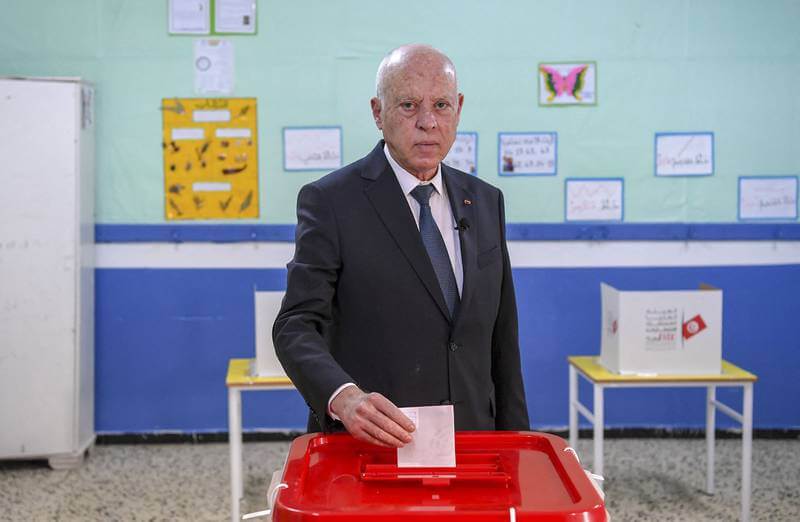In the wake of a voter turnout of just 8.8% in Saturday’s parliamentary election, Tunisian opposition parties have called on President Kais Saied to resign, saying he has lost his legitimacy. The paltry figure is the lowest since the country transitioned to a democracy in 2011 after Tunisians ousted dictator Zine El Abidine Ben Ali in a popular uprising.
The election was the first since Saied ousted the parliament last year and introduced constitutional reforms in September that changed Tunisia's electoral system. Per the new system, voters cast ballots for individual candidates instead of party lists; 1,058 candidates contested 161 seats.
According to reports, with the candidates allowed to run only as individuals, creating alliances for coalitions could prove to be difficult without a party system. Elections will be extended to a second runoff in January, as many candidates could not secure a majority of votes.
ISIE president Farouk Bouasker explained that the low turnout rate is due to “the absence of corrupt political money” from these elections, dubbing it as “pure and legitimate”.
— Ghaya Ben Mbarek غاية بن مبارك (@Ghaya_BM) December 17, 2022
All opposition parties boycotted the election and urged Tunisians not to vote. In fact, several candidates ran unopposed.
The National Salvation Front (NSF), a coalition of opposition parties formed earlier this year, demanded that Saied “leave immediately,” as Tunisians have lost faith in his leadership. Saying Saied has “lost all legitimacy,” NSF President Ahmed Nejib Chebbi noted that “very few Tunisians support Saied’s approach.”
“What happened today is an earthquake,” he said, pointing out that Saied’s “illegitimate” rule has led the country to disaster.
“The curtain has been drawn on the final chapter of Kais Saied’s agenda, and we believe that the participation rate in the elections did not exceed two per cent,” said Chebbi, adding, “Today, there is no remaining legitimacy for Kais Saied.”
Tunisia,
— Africa Elects (@AfricaElect) December 17, 2022
Parliamentary election (voter turnout history)
...
2011: 49.1%
2014: 67.7%
2019: 41.7%
2022: 8.8%
This's the lowest turnout in the history of Tunisia.
➤https://t.co/jglpBIeHzW#TnLeg22 #الانتخابات_التونسية pic.twitter.com/zEKhwReKHr
Similarly, Abir Moussi, the president of the Free Doustouri Party, not only called on Saied to step down but also demanded the suspension of the electoral commission, urging public prosecutors to investigate Saied’s “illegal” path to power.
The Workers Party said in a statement that “meagre participation in the election not only strips all legitimacy from the figurehead parliament, but also strips all legitimacy from the entire July 25 regime,” referring to Saied’s ouster of the parliament in 2021.
In a power grab in July last year, Saied indefinitely suspended the parliament, dismissed the PM, and lifted the immunity of all lawmakers. The decision was condemned by the opposition, which called it a coup. The Ennahda Party said it was “unconstitutional, illegal, and invalid” and that it marked a “return to dictatorship.”
Since then, Saied has taken additional measures to consolidate his position and power, including suspending the constitution, declaring rule by decree, unilaterally appointing a Prime Minister loyal to him, and replacing the country’s independent judicial watchdog. In June, Saied sacked 57 judges over alleged corruption charges and passed a new law that further cemented his hold over the judiciary.
#Tunisia's parliamentary election is akin to a referendum on President Kais Saied's drastic decisions, credibility & legitimacy
— Muhammad Shehada (@muhammadshehad2) December 18, 2022
91,2% didn't vote, significant proportion of them are deliberately boycotting
Nothing would have made a clearer statement of opposition & disapproval! https://t.co/IFjJgSad9J
However, electoral commission chief Farouk Bouasker backed Saturday’s election and Saied’s legitimacy, claiming that the election was the cleanest in Tunisia’s history due to the lack of political financing and vote buying.
“For the first time there have been clean elections and a clean electoral campaign, free from political funding that was the reason behind buying votes. For the first time the Tunisian elections were pure,” he argued.
After casting his ballot, Saied called the election a “historic moment for change.” He also claimed that these legislative elections will “block the way for those who appointed themselves as guardians of Tunisia,” referring to the NSF and the Islamist Ennahda Party.
In July, Saied held a referendum on constitutional changes that garnered a very low voter turnout of 27%. The referendum was passed almost with a 93% approval.
The reforms changed Tunisia’s political structure to give the president more powers than the parliament, upending the parliamentary system. It also allows Saied to sack and name a new government without parliamentary approval, present and approve draft laws without parliamentary scrutiny, and appoint senior judges.

